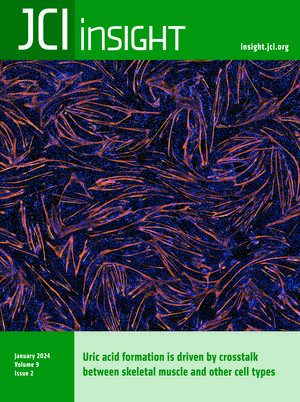CREB-binding protein/P300 bromodomain inhibition reduces neutrophil accumulation and activates antitumor immunity in triple-negative breast cancer.
IF 6.3
1区 医学
Q1 MEDICINE, RESEARCH & EXPERIMENTAL
引用次数: 0
Abstract
Tumor-associated neutrophils (TANs) have been shown to promote immunosuppression and tumor progression, and a high TAN frequency predicts poor prognosis in triple-negative breast cancer (TNBC). Dysregulation of CREB binding protein (CBP)/P300 function has been observed with multiple cancer types. The bromodomain (BRD) of CBP/P300 has been shown to regulate its activity. In this study, we found that IACS-70654, a novel and selective CBP/P300 BRD inhibitor, reduced TANs and inhibited the growth of neutrophil-enriched TNBC models. In the bone marrow, CBP/P300 BRD inhibition reduced the tumor-driven abnormal differentiation and proliferation of neutrophil progenitors. Inhibition of CBP/P300 BRD also stimulated the immune response by inducing an IFN response and MHCI expression in tumor cells and increasing tumor-infiltrated cytotoxic T cells. Moreover, IACS-70654 improved the response of a neutrophil-enriched TNBC model to docetaxel and immune checkpoint blockade. This provides a rationale for combining a CBP/P300 BRD inhibitor with standard-of-care therapies in future clinical trials for neutrophil-enriched TNBC.抑制 CREB 结合蛋白/P300 溴链可减少中性粒细胞的聚集,激活三阴性乳腺癌的抗肿瘤免疫。
肿瘤相关中性粒细胞(TANs)已被证明可促进免疫抑制和肿瘤进展,TANs的高频率可预测三阴性乳腺癌(TNBC)的不良预后。CREB 结合蛋白(CBP)/P300 功能失调已在多种癌症类型中被观察到。CBP/P300的溴结构域(BRD)被证明可调节其活性。在这项研究中,我们发现一种新型选择性 CBP/P300 BRD 抑制剂 IACS-70654 能减少 TANs 并抑制富含中性粒细胞的 TNBC 模型的生长。在骨髓中,CBP/P300 BRD抑制剂可减少肿瘤驱动的中性粒细胞祖细胞异常分化和增殖。抑制CBP/P300 BRD还能通过诱导肿瘤细胞的IFN反应和MHCI表达以及增加肿瘤浸润的细胞毒性T细胞来刺激免疫反应。此外,IACS-70654 还能改善富含中性粒细胞的 TNBC 模型对多西他赛和免疫检查点阻断的反应。这为在未来治疗富含中性粒细胞的TNBC的临床试验中将CBP/P300 BRD抑制剂与标准疗法相结合提供了理论依据。
本文章由计算机程序翻译,如有差异,请以英文原文为准。
求助全文
约1分钟内获得全文
求助全文
来源期刊

JCI insight
Medicine-General Medicine
CiteScore
13.70
自引率
1.20%
发文量
543
审稿时长
6 weeks
期刊介绍:
JCI Insight is a Gold Open Access journal with a 2022 Impact Factor of 8.0. It publishes high-quality studies in various biomedical specialties, such as autoimmunity, gastroenterology, immunology, metabolism, nephrology, neuroscience, oncology, pulmonology, and vascular biology. The journal focuses on clinically relevant basic and translational research that contributes to the understanding of disease biology and treatment. JCI Insight is self-published by the American Society for Clinical Investigation (ASCI), a nonprofit honor organization of physician-scientists founded in 1908, and it helps fulfill the ASCI's mission to advance medical science through the publication of clinically relevant research reports.
 求助内容:
求助内容: 应助结果提醒方式:
应助结果提醒方式:


